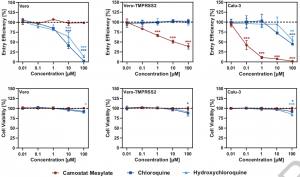In vitro studies during the early stages of the COVID-19 pandemic demonstrated an inhibitory effect of (hydroxy)chloroquine on SARS-CoV-2 entry into host cells (using human cell lines). Based on such results and the anti-viral effect (hydroxy)chloroquine has against other viruses such as Zika and Dengue viruses,(hydroxy)chloroquine was tested as a potential treatment for COVID-19. Despite, studies suggesting a potential beneficial effect of (hydroxy)chloroquine against COVID-19, targeted update of (hydroxy)chloroquine use available on the WHO webpage concludes that:
A recent article by Hoffman et al., aimed to determine if (hydroxy)chloroquine does inhibit SARS-CoV-2 infection in vitro using TMPRSS2-expressing cell lines. TMPRSS2 is a human cellular protease that SARS-CoV-2 uses to facilitate viral entry into host cells. Hoffman et al., demonstrated that (hydroxy)chloroquine inhibited viral entry in Vero (kidney-derived) cell-lines that did not express TMPRSS2, but had no inhibitory effect on Vero cells-lines that expressed TMPRSS2. Additionally, (hydroxy)chloroquine had limited effect on SARS-CoV-2 entry into TMPRSS2-expressing lung cell-lines. Thus providing sufficient evidence as to why (hydroxy)chloroquine may not have had an effect against COVID-19 in humans.
Results presented by Hoffmann et al., emphasise the need for performing in vitro studies that mimic necessary aspects of the human microenvironment, including expression of proteins that are necessary for viral entry.
Hoffman et al., 2020. Chloroquine does not inhibit infection of human lung cells with SARS-CoV-2. Nature
Summary by Cheleka Mpande











